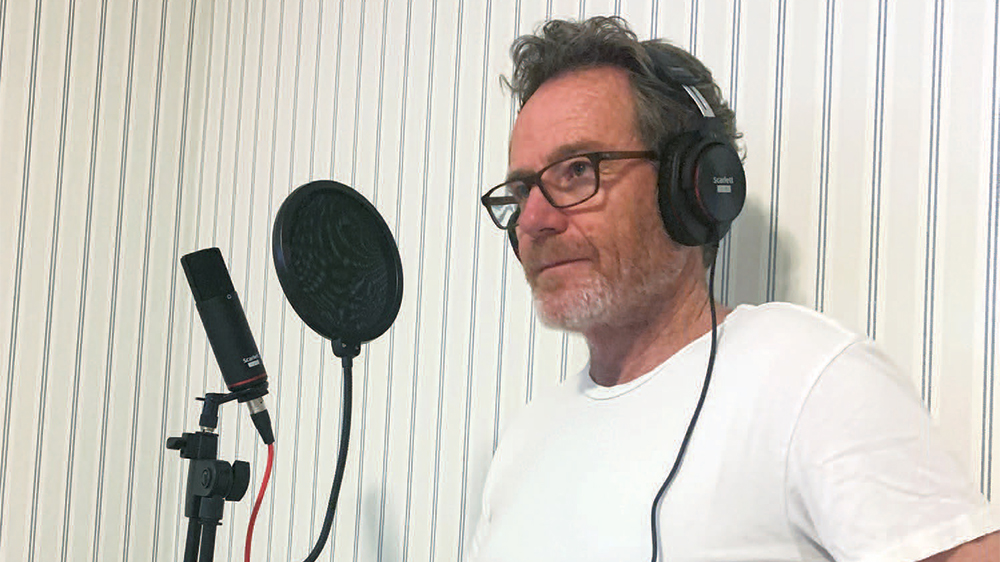Talent Voiceover, Endorsement Gigs Bring Revenue and Relief at UTA During Pandemic
By Matt Donnelly
LOS ANGELES (Variety.com) – In the past three weeks, Emmy winner Bryan Cranston booked a job driving down America’s highways, Tiffany Haddish and rapper-actor Common staged a roving date night and chart-topping producer DJ Khaled performed a duet with his 3-year-old son for a crowd of more than 300,000.
These gigs happened virtually, of course, from the safety of coronavirus quarantine. But as productions remain shuttered across the globe, ongoing voiceover and endorsement work from these stars and more are bringing client revenue and relief efforts at United Talent Agency.
UTA is one of the big four Hollywood deal-making firms impacted by the economic fallout from COVID-19, enacting pay cuts across the board in March to avoid the layoffs that have hit some of their competitors. Voiceover work has become a cash-generating silver lining as hundreds of actors, writers, directors, artisans and public speakers have been sidelined due to shutdowns.
“It’s the one medium that hasn’t really skipped a beat,” says Brittany Balbo, who co-heads UTA’s voiceover and endorsement unit with agent Sam Stone. “There’s a minor dip because of what’s happening in the overall market, but the volume of that business is remarkably consistent.”
Though not as visible as live-action gigs, the voiceover group brokered 1,500 deals in 2019, Balbo and Stone say. From a practical standpoint, voice work has gone uninterrupted thanks to the ease in establishing work-from-home procedures, where actors are serving as talent and crew simultaneously.
“Breaking Bad” star Cranston has been the voice of Ford Motors since 2018. Bereft of a slick Los Angeles studio, he’s been recording from a corner in his home office, on a microphone and mixer he set up himself. Haddish and Common used their cellphones for their date with matchmaking app Bumble. Khaled and son conceived a song about the importance of hand-washing with Dove Men Care, shot in his bathroom and uploaded to his 19.4 million Instagram followers.
“I’m a whiz at technology,” Cranston tells Variety. “All right, I’ll be honest: My assistant, Noor Lawson, set it up. It would have taken me twice as long, and it would have been half as good.”
The actor says he finds the voice gig to be “a creative endeavor, and I sometimes suggest adjustments to the copy, so it keeps me engaged. I don’t diminish its level of importance in the realm of storytelling.”
The need for self-sufficiency is also boosting tech-savvy performers on the agency roster. UTA clients and couple Nick Offerman and Megan Mullally record their Earwolf podcast “In Bed With Nick and Megan” from home. Offerman uses the same studio to log his vocal performance for the Fox animated series “The Great North.”
“Everyone has been learning as they go. One client ended up recording on his iPhone in his closet on Cape Cod for a national commercial, and they’re going to make it broadcast quality,” says Balbo.
The bulk of their projects come from feature and TV animation, which has seen an explosion in the past five years thanks to streaming giants Netflix and Amazon, and now Disney Plus and other nascent OTT platforms.
Netflix in particular has been gunning for a Disney-size vault, expanding from nine original animated series to 30 in the past four years. Episodic animation recorded nearly 180,000 airings on broadcast and cable last year, according to UTA IQ, the agency’s internal data and analytics group. Forty-nine of UTA’s clients landed jobs across 37 animated movies in 2019, which earned $1.8 billion at the domestic box office.
The agency is hustling in step with its competitors, naturally. Endeavor operates a considerable team in voiceover and endorsements between holdings WME and modeling and live events agency IMG. CAA works with top brands in marketing as well as audio categories like podcasts. ICM also has interests in the space, and all have reported upticks in the field.
On the endorsement side, Stone says UTA is engaged in daily high-level conversations with brands and ad agencies in attempts to salvage product campaigns. Celebrity-heavy categories like luxury apparel, automotive and travel have been hit hardest by the pandemic, but workarounds are inevitable.
“Halloween is going to happen this year no matter where we are,” Stone says. “Will we be sending apparel or jewelry to clients’ homes and having them capture that on their own and use that as a campaign? Perhaps. Life goes on and business goes on and the industries that produce those products employ many, many humans.”
Clients are also motivated to bring relief, whether that’s through a scripted laugh or financial measures for first responders. The Bumble campaign donated $50,000 to local restaurants and meals to frontline medical workers. One client flatly turned down an endorsement deal because the prospective brand would not include a charitable component, the agents say.
“Ford is sensitive to what happens in our country. In three years I’ve done spots supporting first responders in the aftermath of two hurricanes and now a pandemic,” Cranston says. “They are socially aware spots — well conceived, beneficial and creative.”
Khaled said “to work with Dove Men + Care during this time was special to me for so many reasons,” who produced his spot with digital creator Uninterrupted.
“Bless Up Dove and Uninterrupted for helping the world realize how to do their part, simply by washing your hands,” he said.
Stone acknowledged that when the severity of the pandemic became obvious, it would have been easy to bury his head in the sand.
“But we have an obligation, not only to the clients but to our colleagues, to be proactive and find revenue,” he says.

